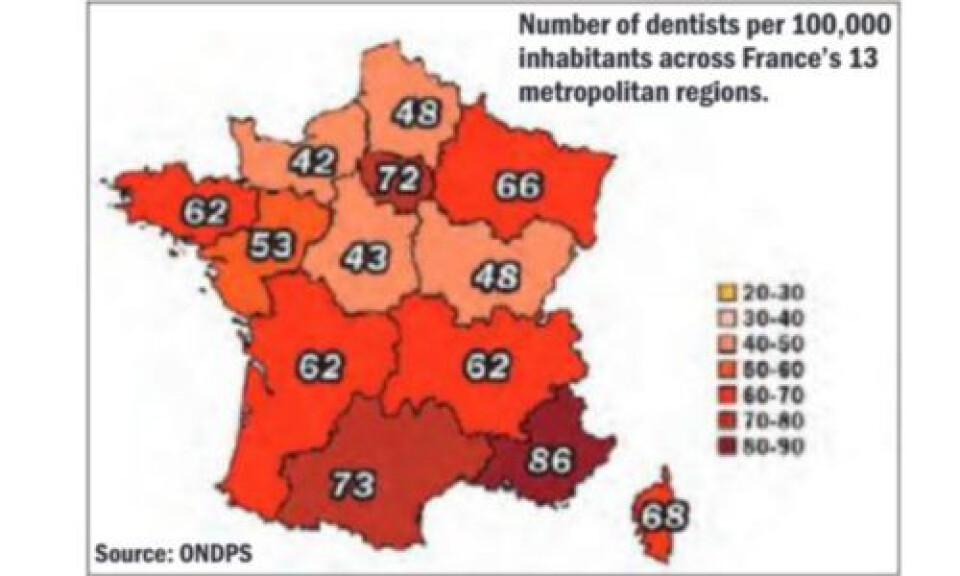-
How to lower the amount you pay for insurance in France
‘Big three’ insurances all set to see costs rise in 2026
-
Peak in flu cases in France expected in January
Pressure on hospitals is expected to intensify after the holiday period
-
New healthcare fee in France: more retirees set to face charge
New wording brings extra people into scope of fee originally aimed especially at American retirees
Dentist shortage in France ‘is unlikely to improve for a decade’
Union representing dentists tells us crisis will continue with four regions showing chronic lack of services

Recent law changes aiming to address France’s shortage of dentists will take several years to make an impact, unions are warning.
The issue was highlighted recently when an agricultural labourer in Charente-Maritime pulled out his own tooth after failing to find an appointment.
One reader also told The Connexion that she contacted 42 dentists in the Morbihan area after hers retired before she found one who would take her – an hour away in Rennes.
Dentist numbers do not meet population growth
Clément Neveu, of the Union Dentaire trade union, said: “Covid accelerated the number of retirements, but this just intensified a crisis that has been ongoing for years.”
Over the past 20 years, the French population grew by more than 10%, but the number of dentists grew only by 4%, according to the latest report by the ONDPS, which studies the demographics of healthcare professionals, in November 2021.
Read more: What is being done about dentist shortages in France?
‘No-shows’ are a problem
Dentists, along with other healthcare workers, have also denounced an increase in no-shows, as platforms such as Doctolib have made it easier to book appointments online.
Some patients take appointments with several dentists, then fail to show up to all but one, or cancel at the last minute.
A recent study by Doctolib found that dentists were the most affected by no-shows, making up 6.2% of appointments made online, compared to 3.4% for GPs.
Read more: France considers charging patients for no-shows at the doctor
Dentists turning patients away report assaults
“Our dentists are close to burnout. They are refusing dozens of patients every day,” Mr Neveu said.
“Last year, I had a dentist who told me ‘I didn’t sleep the other night, because a pregnant woman came at 21:30 and I turned her away. I was exhausted, it was tough to say no, but I could have made a mistake’.”
He is originally from Cher in the Centre-Val de Loire region and said he is regularly contacted by people in his home town who want help finding an appointment.
“I tell them to travel 150km to Paris and find a dentist near the station.”
There have been reports of verbal and even physical assaults aimed at dentists in areas where patients are repeatedly turned away.
“All my dentists say that 30 years ago they were never insulted like that.”
Four regions have chronic shortage
Dentists do, however, have a legal obligation to see patients in an emergency.
There are 62 dentists for every 100,000 inhabitants in France – lower than the EU average (74).
By contrast, there are 43 NHS dentists per 100,000 people in England, though this excludes dentists who are private only.

The real issue in France is geographical disparities.
Four regions have a chronic shortage:
Normandy, Centre-Val de Loire, Hauts de France, and Bourgogne Franche-Comté.
Meanwhile, Île-de-France, Occitanie and Provence-Alpes-Côte d’Azur have the greatest supply.
Reforms will take too long
In 2020, the government abolished the numerus clausus, a cap on medical and dentistry student numbers, but it will take around seven years for the additional students to graduate.
“We have been warning that there would be a demographic problem for the last 20 years,” Mr Neveu said.
“There are no instant solutions. The next decade will be difficult.”
Other measures include the recent creation of eight new university dentistry departments, and monthly stipends for students who agree to practise in an area with shortages for at least two years.
In May, MPs passed a law that will create a new role of ‘level two’ dental assistants who are able to help dentists with a greater number of tasks.
The Union Dentaire has welcomed the move, but warned it could take at least five years to define and develop the profession.
“It will also require a second chair. Is there going to be enough space? It’s not always certain,” said Mr Neveu.
One reform lead to ‘low-cost’ dental centre scandals
Another measure aimed at combating ‘medical deserts’ where there is a lack of dentists has been labelled counter-productive by unions.
The 2009 loi Bachelot allowed associations to open dental centres without authorisation from ARS regional health authorities, but most have opened in areas where there are already enough dentists.
“The younger generation is setting up in cities, in places where there is less need,” said Mr Neveu.
The policy also led to a number of scandals surrounding ‘low-cost’ dental centres, such as Dentexia and Proxidentaire, with patients filing complaints after paying for treatment that was never finished, or did more harm than good.
A law change adopted in May reinstated the requirement for ARS approval.
Related articles
French state to reduce the amount it contributes to your dental bills
























